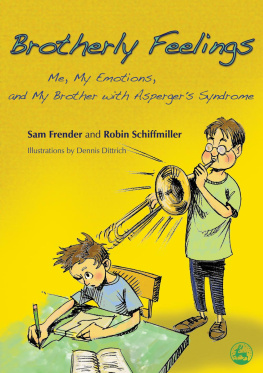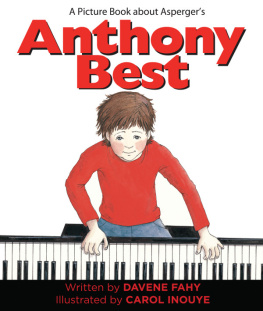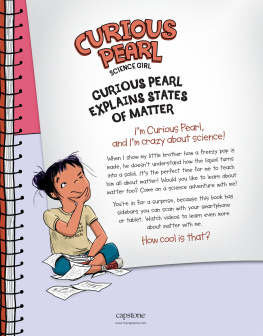
Brotherly Feelings
of related interest
Special Brothers and Sisters
Stories and Tips for Siblings of Children with a Disability or Serious Illness
Edited by Annette Hames and Monica McCaffrey
Illustrated by Brendan McCaffrey
ISBN 978 1 84310 383 7
All Cats Have Asperger Syndrome
Kathy Hoopmann
ISBN 978 1 84310 481 0
Do You Understand Me?
My Life, My Thoughts, My Autism Spectrum Disorder
Sofie Koborg Brsen
ISBN 978 1 84310 464 3
The Complete Guide to Aspergers Syndrome
Tony Attwood
ISBN 978 1 84310 495 7
Aspergers Syndrome A Guide for Parents and Professionals
Tony Attwood
Foreword by Lorna Wing
ISBN 978 1 84310 577 8
Different Like Me
My Book of Autism Heroes
Jennifer Elder
Illustrations by Marc Thomas and Jennifer Elder
ISBN 978 1 84310 815 3
Baj and the Word Launcher
Space Age Asperger Adventures in Communication
Pamela Victor
Cover illustration by Chris Shadoian
ISBN 978 1 84310 830 6
Brotherly Feelings
Me, My Emotions, and My Brother with Aspergers Syndrome
Sam Frender and Robin Schiffmiller
Illustrations by Dennis Dittrich

Jessica Kingsley Publishers
London and Philadelphia
First published in 2007
by Jessica Kingsley Publishers
116 Pentonville Road
London N1 9JB, UK
and
400 Market Street, Suite 400
Philadelphia, PA 19106, USA
www.jkp.com
Copyright Sam Frender and Robin Schiffmiller 2007
Illustrations copyright Dennis Dittrich 2007
All rights reserved. No part of this publication may be reproduced in any material form (including photocopying or storing it in any medium by electronic means and whether or not transiently or incidentally to some other use of this publication) without the written permission of the copyright owner except in accordance with the provisions of the Copyright, Designs and Patents Act 1988 or under the terms of a licence issued by the Copyright Licensing Agency Ltd, 90 Tottenham Court Road, London, England W1T 4LP. Applications for the copyright owners written permission to reproduce any part of this publication should be addressed to the publisher.
Warning: The doing of an unauthorised act in relation to a copyright work may result in both a civil claim for damages and criminal prosecution.
Library of Congress Cataloging in Publication Data
Frender, Sam, 1996
Brotherly feelings : me, my emotions, and my brother with Aspergers syndrome / Sam Frender and Robin Schiffmiller ; illustrations by Dennis Dittrich. -- 1st pbk. ed.
p. cm.
ISBN-13: 978-1-84310-850-4 (pbk. : alk. paper)
ISBN-10: 1-84310-850-X (pbk. : alk. paper)
1. Aspergers syndrome--Juvenile literature. 2. Aspergers syndrome--Patients--Family relationships--Juvenile literature. I. Schiffmiller, Robin, 1957- II. Title.
RJ506.A9B7644 2007
618.92858832--dc22
2006031696
British Library Cataloguing in Publication Data
A CIP catalogue record for this book is available from the British Library
ISBN 978 1 84310 850 4
ISBN eBook pdf: 1 84642 594 8
Printed and bound in the United States by
Thomson-Shore, Inc.
A Note for Parents and Professionals
The characters in this book are based on my own sons: Eric (age 13) who has Aspergers Syndrome, and Sam (age 8) who is neurotypical.
Caring for Eric has always been a full-time job frequently requiring undivided attention and crisis management. During these stressful times, I have always worried that my lack of immediate focus on Sam might make him feel neglected, unsafe, or even unloved. How many times has he made sacrifices, waited in doctors offices, or given up play dates or vacation time? How often has he had to watch temper tantrums, or deal with his brothers social awkwardness? I was desperate to know how Sam was feeling.
The goal of this book is to provide the siblings of children with Aspergers Syndrome with an opportunity to explore their feelings and talk about their experiences. It is intended to reassure these children that they are not alone, and to let them know that there are many other children who face similar challenges and have similar feelings. By encouraging our children to articulate their feelings about their siblings, we are better able to understand their concerns, and can become more effective in helping them learn to cope.
As young children become more aware of the world around them, they also become increasingly more aware of the out of sync behaviors of their sibling with Aspergers Syndrome. These behaviors, which once elicited their curiosity, compassion, or even amusement, can later cause them feelings of jealousy, resentment and frustration, or even a desire for revenge.
Since siblings will have relationships with each other long after we are gone, it is extremely important for typical siblings to become comfortable with, and accepting of, their Aspergers siblings. Conventional sibling rivalry is tough enough...rivalry with a special needs sibling can be overwhelming. In fact, many of the experiences in this book are not unique to being the sibling of a child with Aspergers Syndrome, and may be of use to siblings of children with other special needs as well.
The first section of this book describes common characteristics of Aspergers Syndrome in a way that a child will understand. It then goes on to discuss the feelings that neurotypical siblings are likely to experience, at various times, during their relationships with their brother or sister with Aspergers.
The experiences described in the book can be used to help initiate conversations between our children and the many important people in their lives: their brother or sister with Aspergers, their parents, their therapist, plus extended family members or friends. They will also help children explore conflicts within themselves; for example, the loving, yet resentful, feelings they have for their sibling; or the frustrations of being younger, yet feeling more mature.
Acceptance of these feelings helps promote the self-acceptance and self-respect so critical to all children.
If it helps, you can read this book with your neurotypical children. It is not necessary to read the entire book in one sitting. You can pick and choose feelings to read as they become relevant, or read one or two feelings each night. Also, you can refer back to specific feelings over and over again.
Ask your children if they have ever experienced these same feelings. Encourage them to give examples. Perhaps they have feelings which are similar or perhaps the feelings which are described in the book will cause them to think of other feelings.
Ask your children to help Sam solve his problems. What should Sam say to his parents or to his brother in order to help him resolve his feelings? What advice would you give Sam?
By articulating these feelings, siblings of children with Aspergers Syndrome are able to see their brother or sister in a different light, and think about their relationship in a rational and reasoned way. They will feel relieved to know that you are aware of their feelings, that their feelings are legitimate, and that you still love them.
It will also be helpful to read this book with children who have Aspergers Syndrome. Children with Aspergers Syndrome are usually unaware of the impact their behavior has on those around them. Their world is relatively self-centered and self-contained, and the frustrations that can be felt by their sibling rarely enter their thoughts.
Next page












